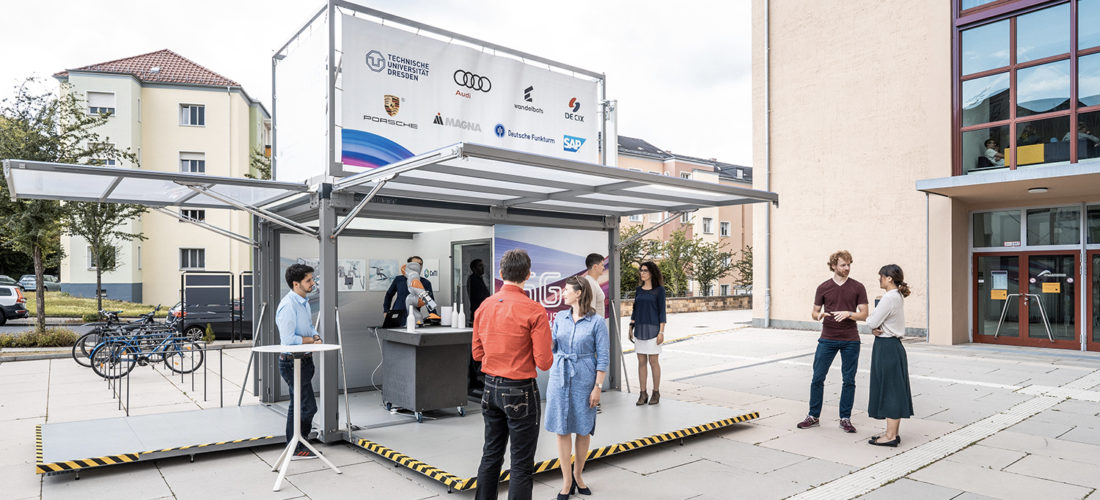The digitization of the industry must be driven forward.
The digitization of industry and manufacturing is being driven by many technologies. Be it artificial intelligence, cloud computing or massive IoT. All these technologies share a common basis: data exchange via communication networks. The next generation of mobile communications has been designed to guarantee both high data rates, a huge number of data connections and low response times wirelessly. While mobile communications have hardly been associated with automation technology in the past, 5G opens the door for mobile communications to enter automation technology for the factories of the future. Industry 4.0 becomes tangible.
A lot of research is currently being done on the question of integrating mobile networks into the evolved shop-floor infrastructure, with the introduction of 5G campus networks emerging as probably the best option. Campus networks are local 5G networks that, thanks to 5G, meet the stringent requirements of automation technology. In addition, there is a dedicated frequency range for these local cellular networks, providing significant advantages in terms of susceptibility to interference and security. While other wireless communication technologies, such as WLAN or Bluetooth, quickly reach their limits due to an open and highly limited spectrum, 5G campus networks can both network more devices and ensure the quality of the data connection for individual applications.
Portfolio
This is done through network slicing. From the use of augmented reality glasses for fault identification and warning, to sensors for automatic detection of positions, control of automated guided vehicles from the cloud, more flexible use of robots, and networking of drones for logistics or quality assurance.
At the forefront of research into campus networks is the Deutsche Telekom Chair of Prof. Frank Fitzek at the TU Dresden with the 5G Island project. The project, which has already been running for a year, is working with project partners SAP, Audi, Porsche, Volkswagen, Deutsche Telekom, Wandelbots, DE-CIX, Magna and Deutsche Funkturm to examine use cases for campus networks, identify them and implement them on a pilot basis. In order to be able to answer the questions of each project partner, 5G campus containers were set up. These house a complete 5G mobile network that can be transported. This makes it possible to set up a 5G network anywhere within a few hours. Many use cases can be tested proof-of-concept directly on site. Each project partner can test their use cases without having to purchase their own hardware. The first tests for robot automation using 5G are scheduled to take place in craft businesses this year.

5G hands-on.
To demonstrate a 5G campus network, a transportable 5G GeniusNetwork was set up, which directly enabled real 5G communication.

The campus-network concept.
A campus network also allows self-sufficient operation without connection to external networks. Connection to the Internet or other mobile networks can be established – even SDNs with network slicing become possible.
The idea of the transportable network as a prelude to company-owned 5G campus networks was further developed at TU Dresden and is reflected in the spin-off CampusGenius GmbH. Employees from the 5G Island project offer companies, among other things, the opportunity to rent a 5G campus network in order to implement their own proof-of-concepts. This gives companies the option of testing the possibilities of a 5G network themselves with little financial risk together with experts. In addition to consulting on sensible 5G applications and their integration into the network, the experience is also used to set up permanent 5G campus networks for permanent operation after the test phase.
The idea and possibility of renting 5G campus networks also benefits the Smart Systems Hub in Dresden. The Hub can provide such a network as part of its co-innovation offerings. In these projects, companies from different fields work on solutions. CampusGenius helps prepare the network so that the applications work ideally. With a campus network, companies can jointly develop products for 5G applications and then test them with the flexible network once in the lab but also directly on-site without great risk for purchased infrastructure. This offer is so far unique in Germany.
Guest article at the Smart Systems Hub Read here
About CampusGenius
CampusGenius is a young company founded in 2020 in Dresden, Germany which is dedicated to the planning, construction and operation of 5G campus networks as well as the integration of applications. CampusGenius was founded by mobile communications experts and researchers from the Deutsche Telekom Chair for Communication Networks at TU Dresden, whose experience in core architecture, management and configuration of 5G campus networks is transferred into the company. CampusGenius uses software and hardware solutions from well-known manufacturers, but also offers its own developed 5G core Software and OSS.
CampusGenius – Dedication to Communication.






